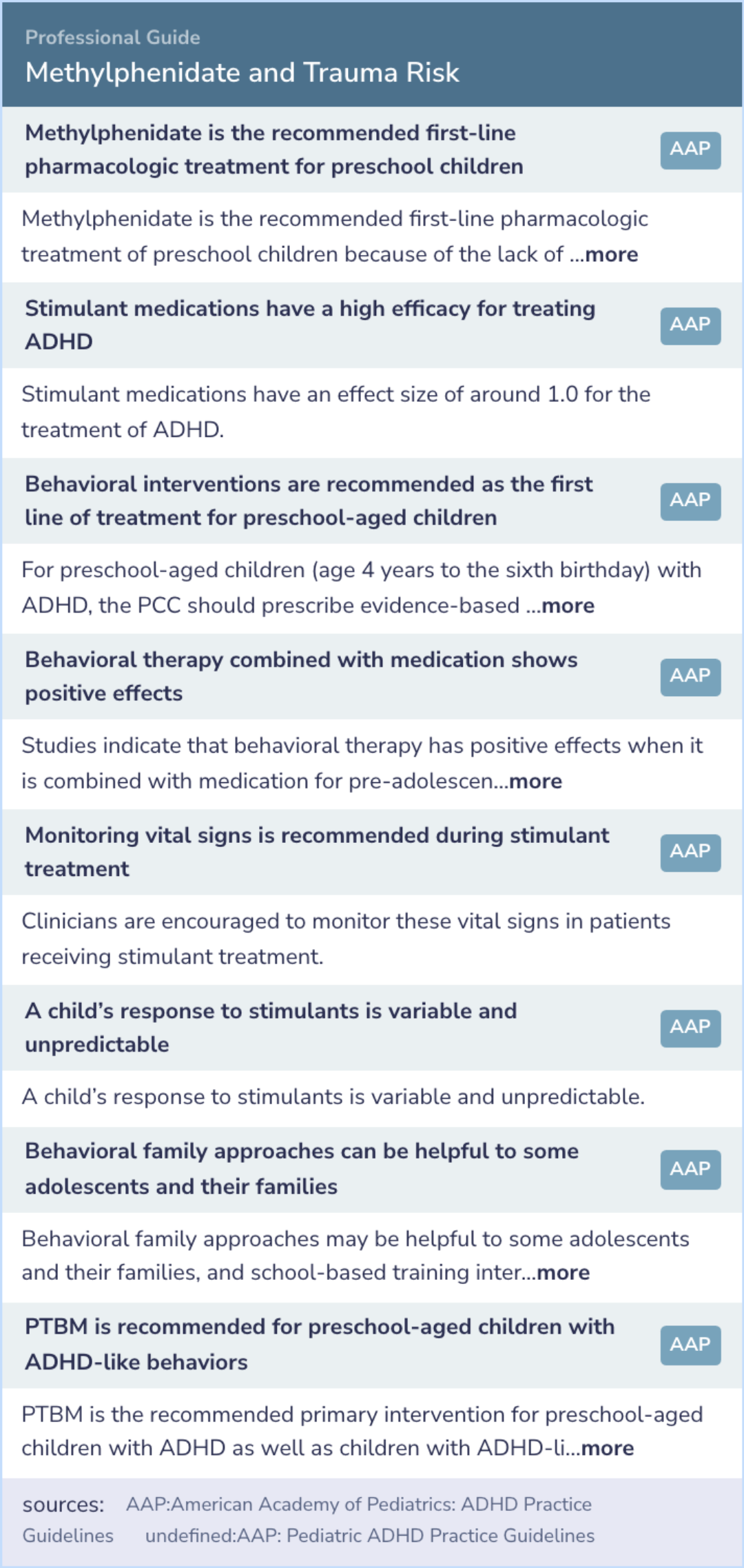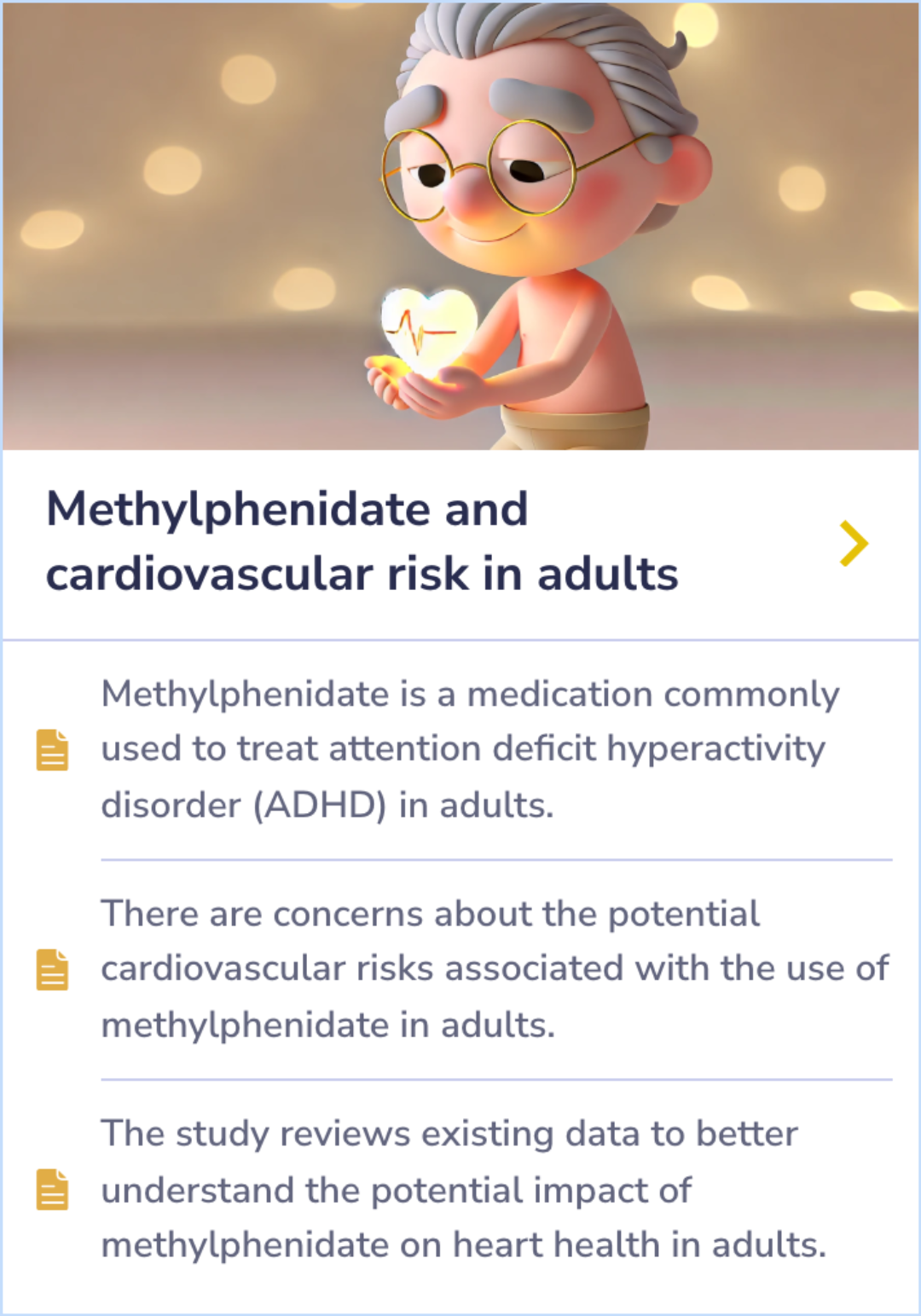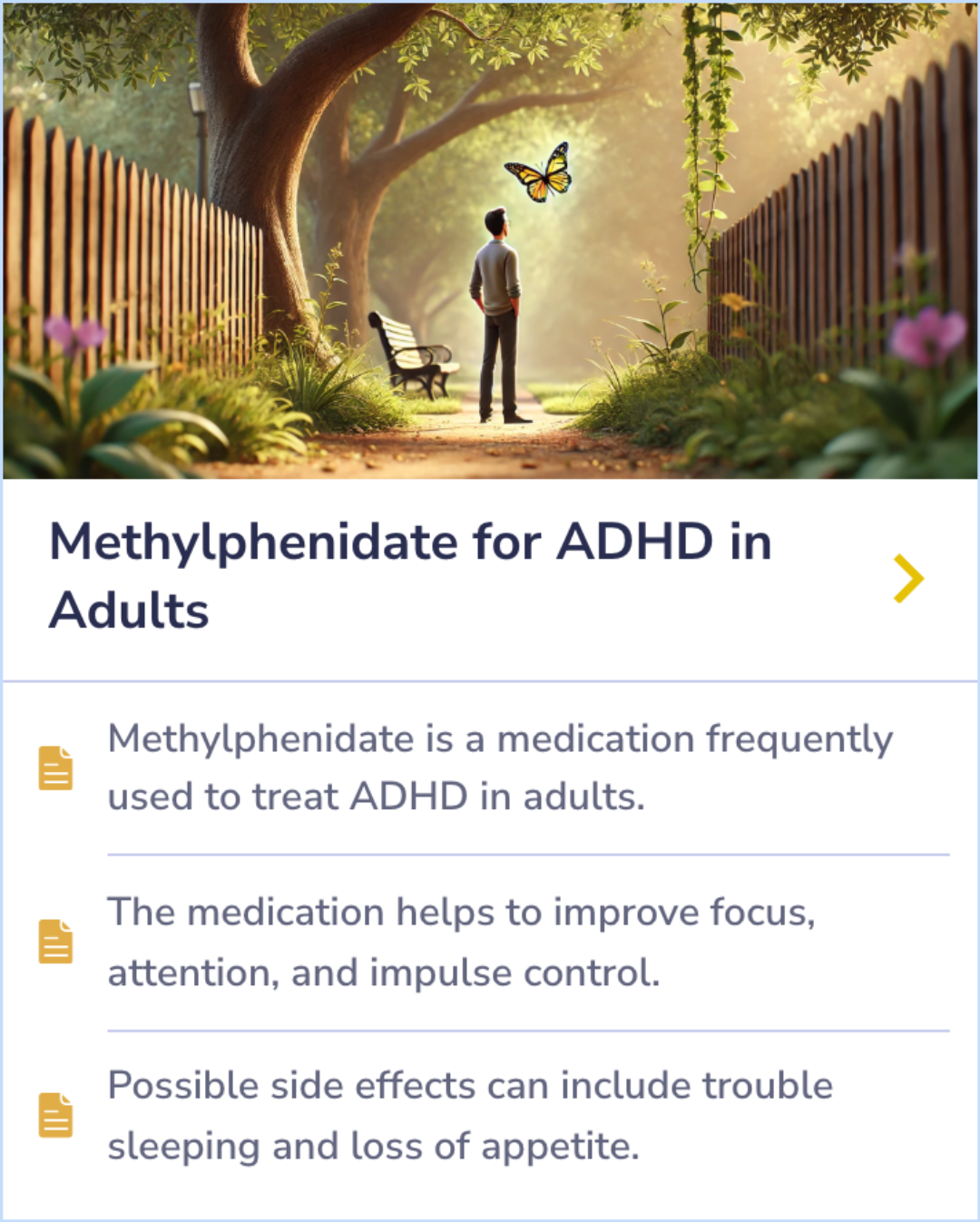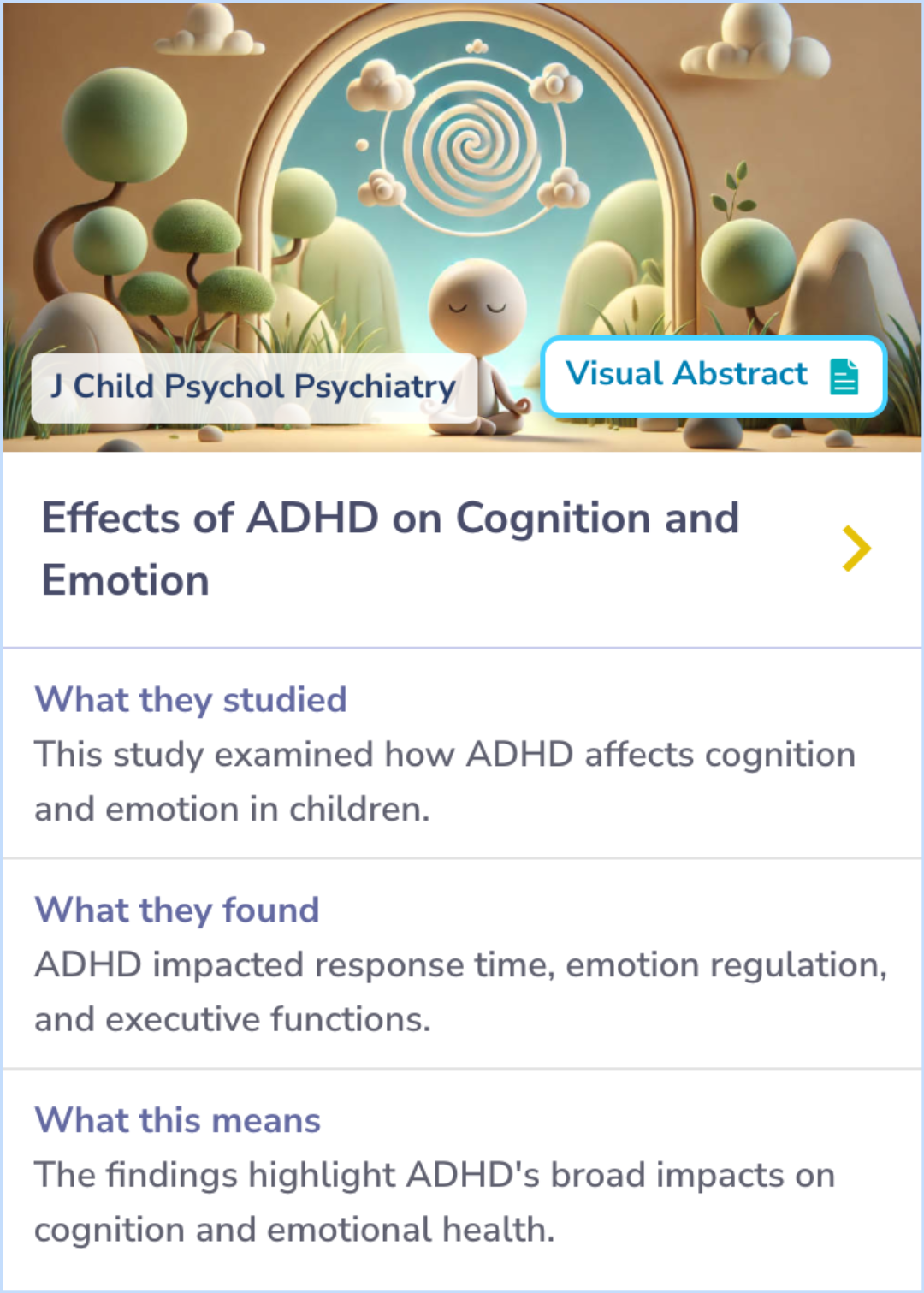Ritalin Paper Database
Visual Abstract
Methylphenidate and the risk of trauma
Methylphenidate and Trauma Risk
August 27, 2024
author
Man KK, Chan EW, Coghill D, Douglas I, Ip P, Leung LP, Tsui MS, Wong WH, Wong IC
journal
Pediatrics
Date Published
January 2015
Why link to a visual abstract?
What is a visual abstract?
Original
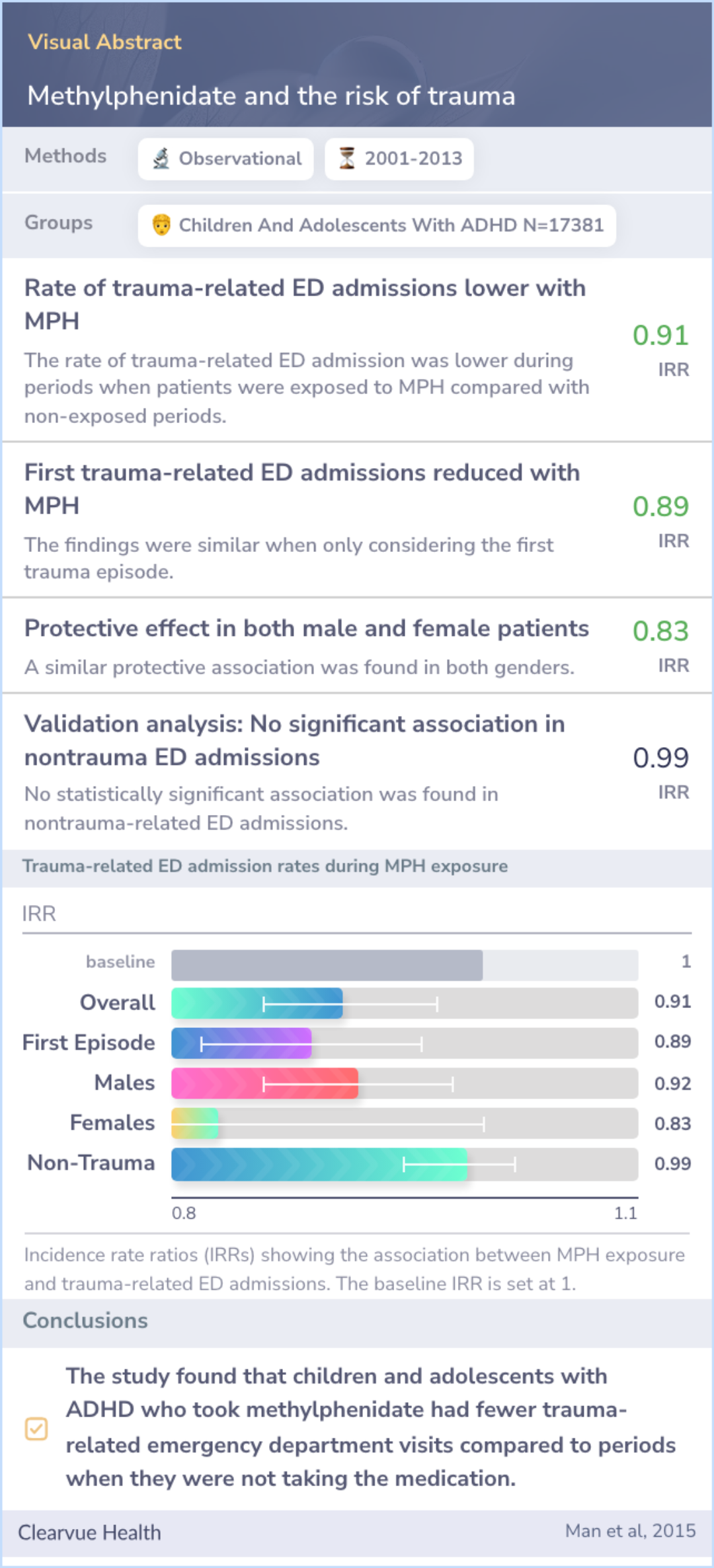
Study Summary
🔬
What They Studied
The researchers studied whether methylphenidate (Ritalin, Concerta) reduces the risk of trauma-related emergency department visits in children and adolescents with ADHD.
💡
What They Found
They found that the rate of trauma-related emergency department visits was lower during periods when children and adolescents were taking methylphenidate compared to when they were not.
📚
What This Means
The findings suggest that taking methylphenidate (Ritalin, Concerta) can reduce the risk of trauma-related emergency room visits for children and adolescents with ADHD, which supports its use as an effective treatment option.
Study Summary
Study Overview
Attention-deficit/hyperactivity disorder (ADHD) affects many children and teenagers, making it hard for them to stay focused and control their impulses. Managing these symptoms is crucial because ADHD can greatly affect their relationships, school performance, and overall happiness. This study wanted to see if taking methylphenidate (commonly known as Ritalin or Concerta), a medication often prescribed for ADHD, could also help reduce the number of emergency room visits due to injuries in these kids.
The researchers found that when children and adolescents with ADHD took methylphenidate, they were less likely to end up in the emergency room because of injuries. This protective effect was consistent across both boys and girls. The study’s design helped ensure these findings were reliable, suggesting that the reduced injury risk was indeed due to the medication, not other factors. These results support the idea that methylphenidate not only helps manage ADHD symptoms but also offers an important safety benefit by reducing injury risks. This information is valuable for doctors and policymakers when considering the overall benefits of methylphenidate for treating ADHD.
The researchers found that when children and adolescents with ADHD took methylphenidate, they were less likely to end up in the emergency room because of injuries. This protective effect was consistent across both boys and girls. The study’s design helped ensure these findings were reliable, suggesting that the reduced injury risk was indeed due to the medication, not other factors. These results support the idea that methylphenidate not only helps manage ADHD symptoms but also offers an important safety benefit by reducing injury risks. This information is valuable for doctors and policymakers when considering the overall benefits of methylphenidate for treating ADHD.
Abstract: background
Children and adolescents with attention-deficit/hyperactivity disorder (ADHD) are prone to sustaining trauma that requires emergency department (ED) admission. Methylphenidate (MPH) can reduce ADHD symptoms and may thus theoretically reduce the risk ...more

Protective Benefits
"The findings of this study suggest that methylphenidate (MPH) is associated with a reduced risk of trauma-related ED admission in children and adolescents with ADHD. This supports the hypothesis that MPH treatment can offer protective benefits against trauma."
Study Design and Reliability
"This study addresses several limitations of previous research by using a self-controlled case series design, which minimizes bias due to confounding by indication and ADHD severity."
Safety Benefit
"Our data suggest that trauma prevention should be considered a significant benefit of MPH treatment in the clinical management of ADHD."
Study Summary
Methods
Researchers identified 17,381 patients aged 6 to 19 who were prescribed MPH using the Clinical Data Analysis & Reporting System spanning from 2001 to 2013. The study used a design called the self-controlled case series, which helps compare periods when these patients were on MPH to when they were not, in terms of their rates of trauma leading to ED visits.
This approach allowed for observing the same individuals under conditions of both exposure to MPH and non-exposure, minimizing differences between participants that could affect results.
This approach allowed for observing the same individuals under conditions of both exposure to MPH and non-exposure, minimizing differences between participants that could affect results.
Abstract: methods
A total of 17 381 patients aged 6 to 19 years who received MPH prescriptions were identified by using the Clinical Data Analysis & Reporting System (2001-2013). Using a self-controlled case series study design, the relative incidence of trauma-relate...more

Study Summary
Results
Out of the 17,381 children and adolescents prescribed MPH, 4,934 experienced at least one trauma-related ED visit. The study showed fewer trauma-related ED visits when patients were taking MPH compared to periods when they were not. This reduction in ED visits was seen across both boys and girls.
Additionally, the study didn't find a similar pattern for non-trauma ED visits, suggesting that the reduction was specific to trauma incidents. This consistency across different analyses strengthens the findings suggesting MPH might lower risks of trauma.
Additionally, the study didn't find a similar pattern for non-trauma ED visits, suggesting that the reduction was specific to trauma incidents. This consistency across different analyses strengthens the findings suggesting MPH might lower risks of trauma.
Abstract: results
Among 17 381 patients prescribed MPH, 4934 had at least 1 trauma-related ED admission. The rate of trauma-related ED admission was lower during exposed periods compared with nonexposed periods (incidence rate ratio [IRR]: 0.91 [95% confidence interva...more
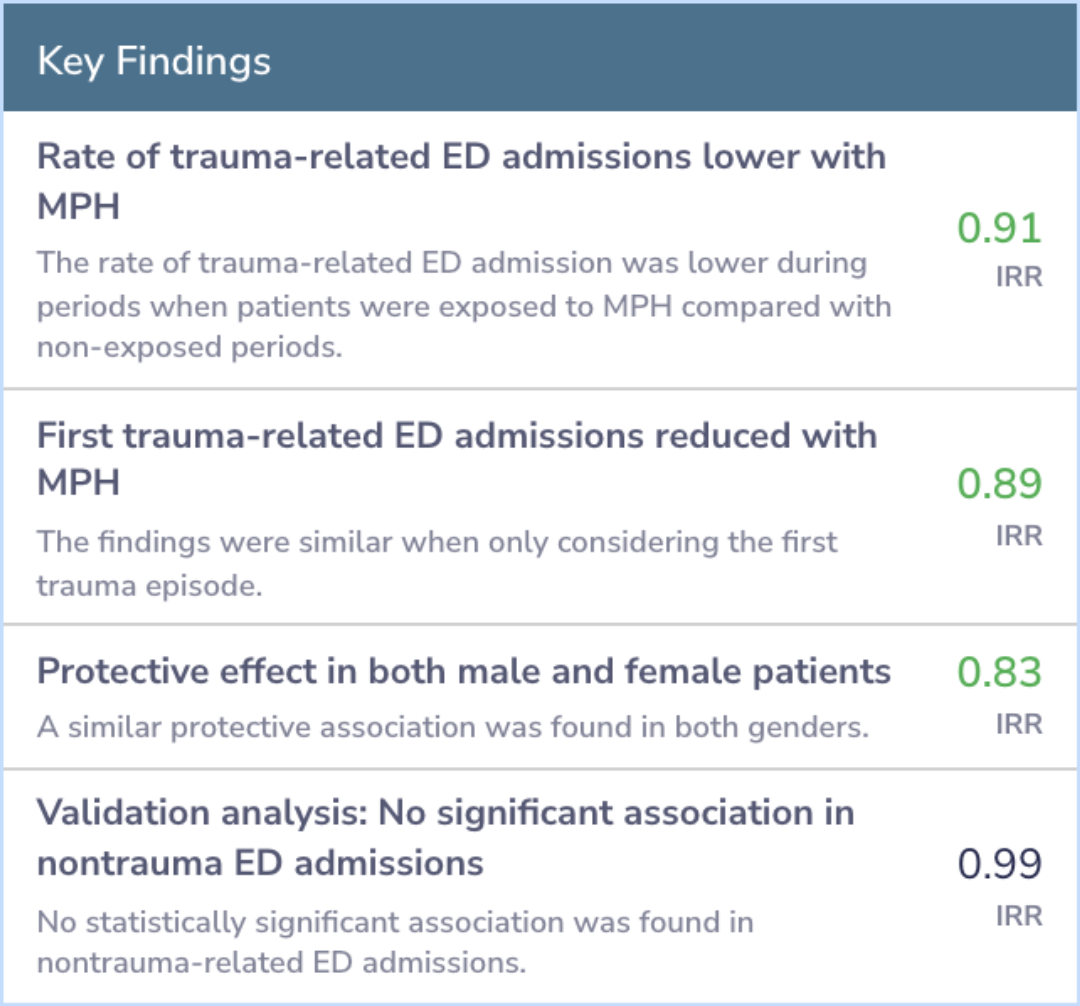
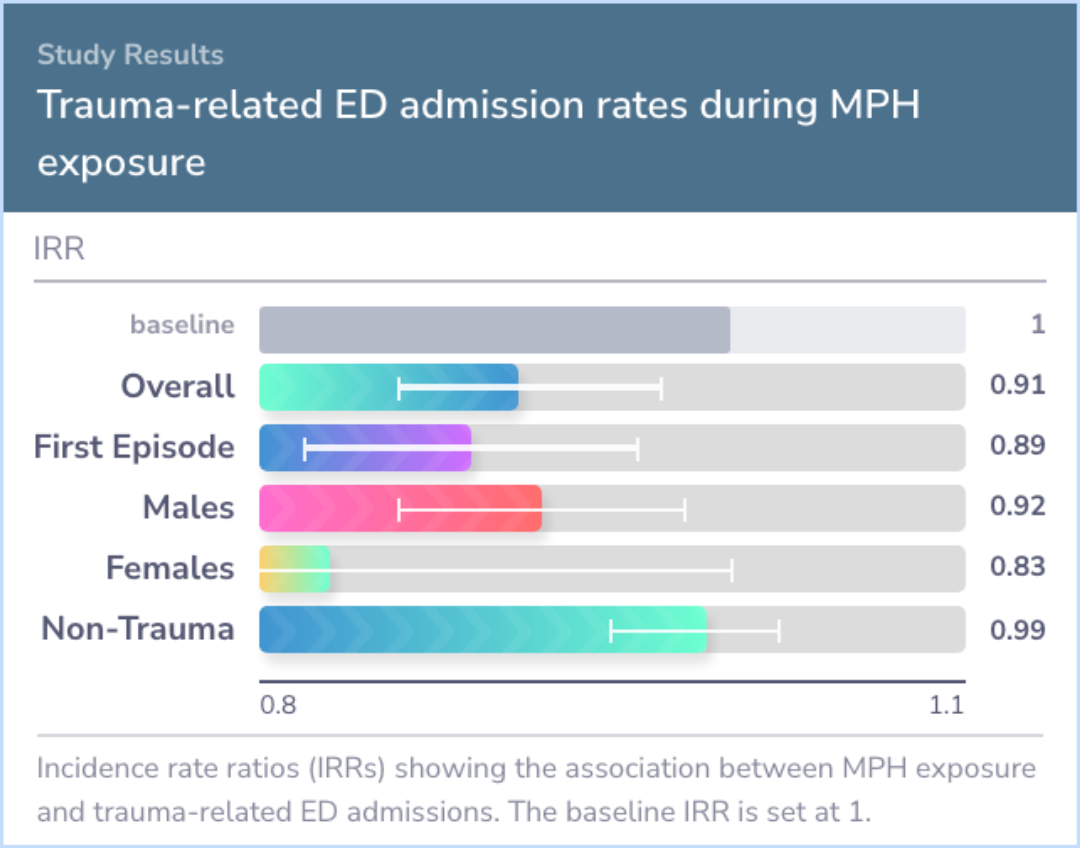
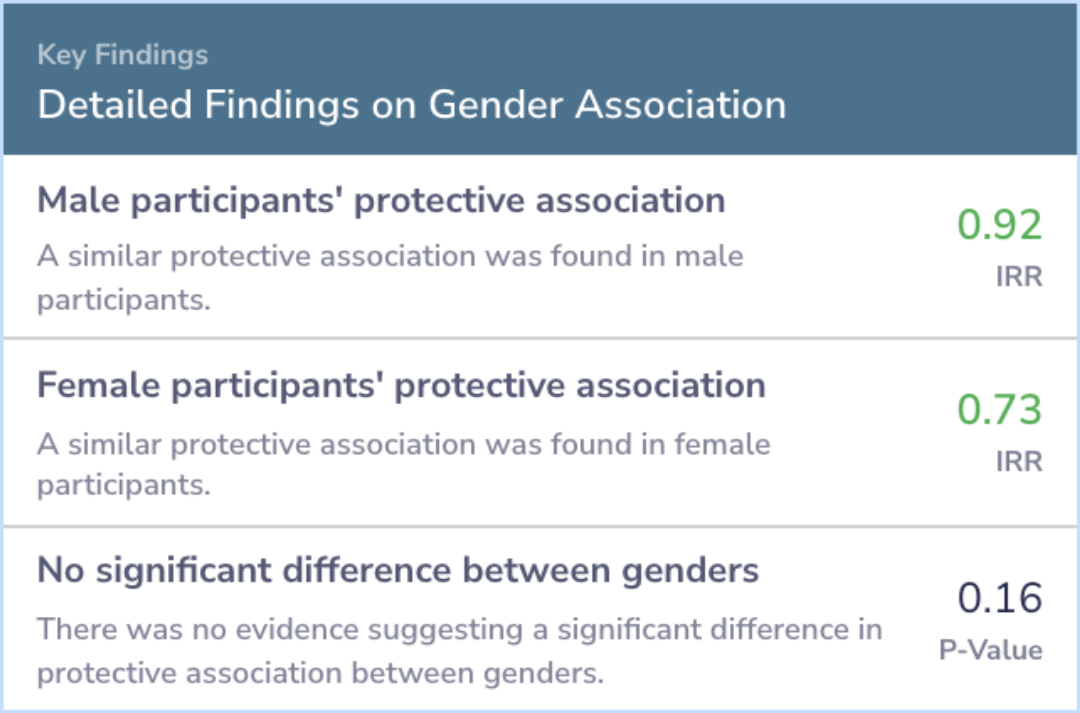
Study Summary
Conclusions
The study concludes that the use of Methylphenidate (MPH) is associated with a reduced risk of trauma-related visits to the emergency department among children and teenagers with ADHD. This association is consistent across both male and female patients.
These results should be taken into account in clinical settings, potentially influencing how ADHD is managed to reduce injury-related emergencies.
These results should be taken into account in clinical settings, potentially influencing how ADHD is managed to reduce injury-related emergencies.
Abstract: conclusions
This study supports the hypothesis that MPH is associated with a reduced risk of trauma-related ED admission in children and adolescents. A similar protective association was found in both male and female patients. This protective association should ...more
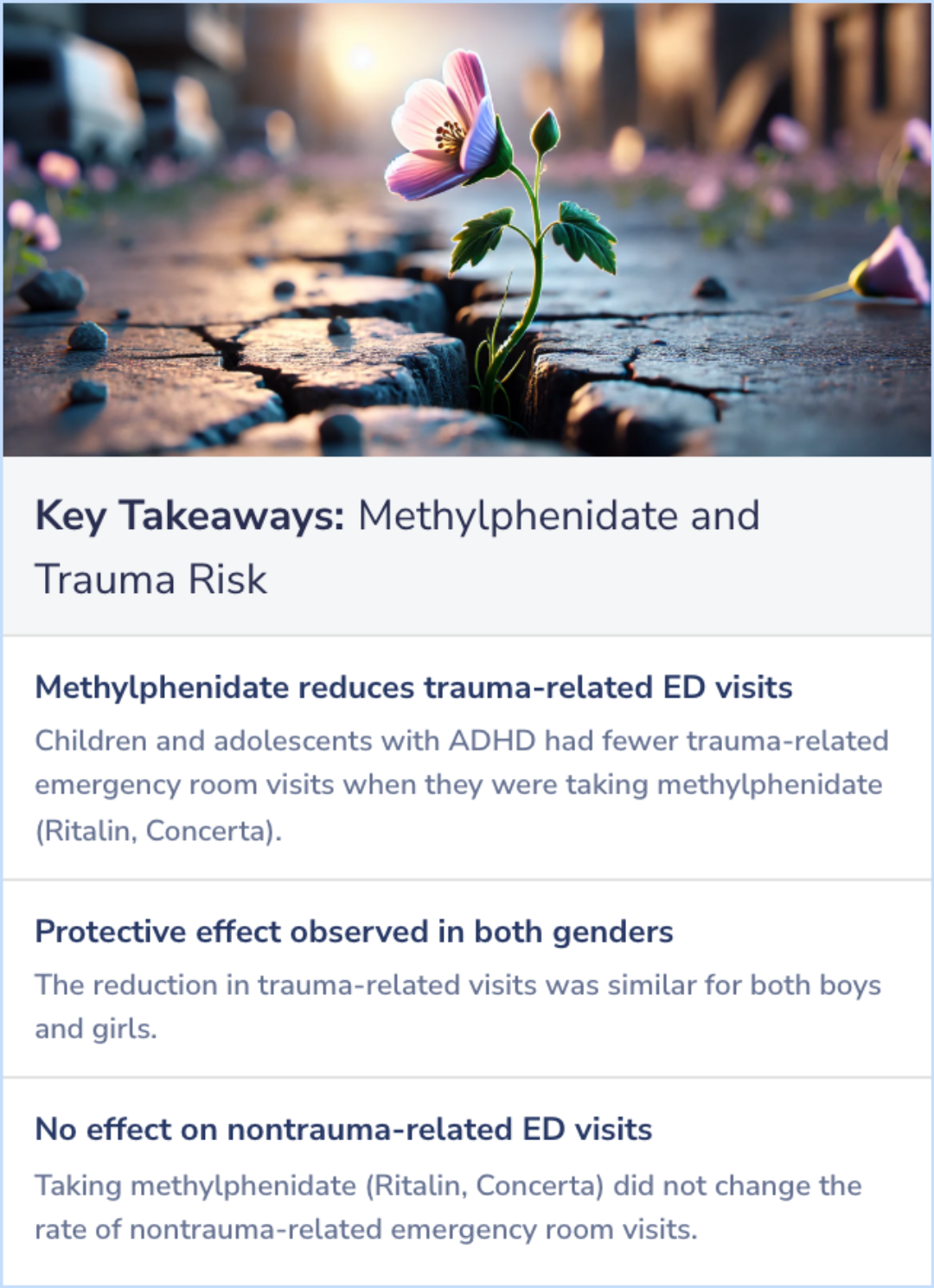
Background Information
Patient Guide
👨⚕️
Methylphenidate Approved Uses
FDA-approved for treating ADHD in children and adults; also a second-line treatment for narcolepsy.
🧠
Mechanism of Action
Blocks norepinephrine and dopamine reuptake, boosting their concentration in the synaptic cleft.
🧒
Age Restriction
Children must be six years or older to be prescribed methylphenidate for ADHD.
❤️
Cardiovascular Risks
Can exacerbate cardiovascular symptoms like palpitations; not recommended for serious heart conditions.
🧠
Psychiatric Side Effects
May worsen psychosis or bipolar disorder, and can increase aggressive behavior.
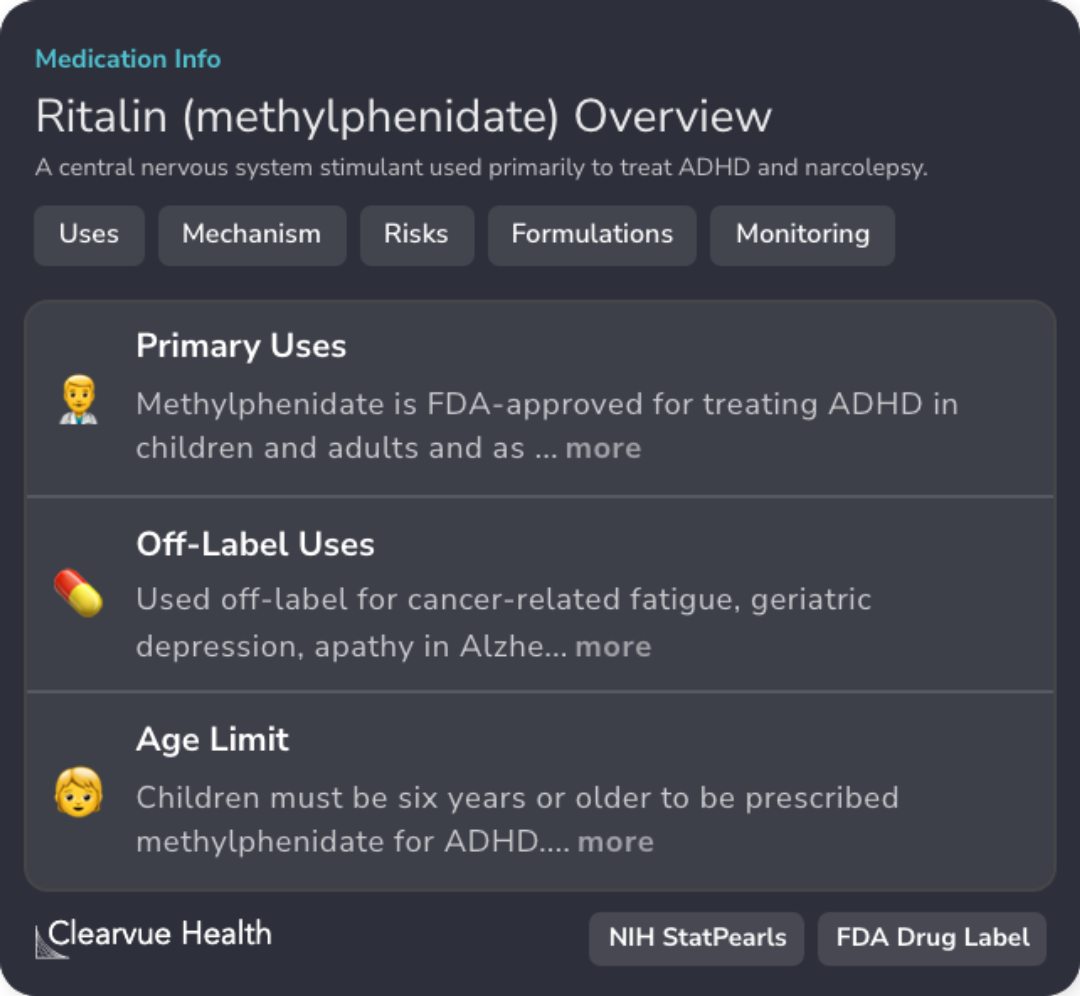
Professional Guide
Expert Opinion: Methylphenidate and Trauma Risk
In line with the findings on the reduced risk of trauma-related ED admissions associated with methylphenidate (MPH) treatment, the American Academy of Pediatrics recommends MPH as the first-line pharmacologic treatment for preschool children.
Stimulant medications, including MPH, exhibit a high efficacy for treating ADHD, with an effect size of around 1.0.
For preschool-aged children, evidence-based behavioral parent training in behavior management (PTBM) and classroom interventions should be the first line of treatment if available.
Additionally, the combination of behavioral therapy and medication shows positive effects in pre-adolescent children.
Clinicians are also encouraged to monitor vital signs in patients receiving stimulant treatment, highlighting the need for careful management during ADHD therapy.
Stimulant medications, including MPH, exhibit a high efficacy for treating ADHD, with an effect size of around 1.0.
For preschool-aged children, evidence-based behavioral parent training in behavior management (PTBM) and classroom interventions should be the first line of treatment if available.
Additionally, the combination of behavioral therapy and medication shows positive effects in pre-adolescent children.
Clinicians are also encouraged to monitor vital signs in patients receiving stimulant treatment, highlighting the need for careful management during ADHD therapy.
Evidence Summary
Methylphenidate: Safety Concerns for Adult ADHD Treatment
The article investigates if methylphenidate, commonly used to treat ADHD in adults, carries cardiovascular risks. Delving into existing studies, it aims to clarify how this medication might impact heart health. Critics have long worried about the effects of methylphenidate on the cardiovascular system, prompting this in-depth review of available data to better gauge its safety for adult users.
Understanding these potential risks is important, especially given how widely methylphenidate is prescribed for adult ADHD. The findings from this research could help healthcare providers make more informed decisions on prescribing practices.
Looking at heart health effects, this exploration sheds light on the balance between managing ADHD symptoms and safeguarding cardiovascular health.
Understanding these potential risks is important, especially given how widely methylphenidate is prescribed for adult ADHD. The findings from this research could help healthcare providers make more informed decisions on prescribing practices.
Looking at heart health effects, this exploration sheds light on the balance between managing ADHD symptoms and safeguarding cardiovascular health.
Evidence Summary
Managing ADHD in Adults with Methylphenidate
Methylphenidate is a well-known medication prescribed for ADHD in adults. It boosts attention and focus while managing impulsivity. However, it can cause side effects, including insomnia and reduced appetite. It's important to note that while methylphenidate effectively improves concentration and impulse control, users should be aware of these possible side effects.
Regular monitoring and communication with healthcare providers can help manage these side effects effectively.
Regular monitoring and communication with healthcare providers can help manage these side effects effectively.
Evidence Summary
Understanding ADHD Through Neuropsychological Deficits
ADHD is not a one-size-fits-all disorder. This study found that children with ADHD show differences in cognition and emotion, impacting response time and executive functions. Children with ADHD struggled with various neuropsychological deficits and emotion regulation, showing unique patterns compared to their peers.
However, there were no significant differences for delay aversion and recognition of disgust. Gender did not play a significant role in these findings, emphasizing the complexity of ADHD.
However, there were no significant differences for delay aversion and recognition of disgust. Gender did not play a significant role in these findings, emphasizing the complexity of ADHD.
